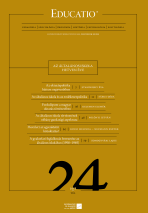Tudásverseny és globalizáció
Skills’ Comparison and Globalization
Author(s): Géza SáskaSubject(s): Politics, Education, Recent History (1900 till today), History of Education, State/Government and Education, Post-War period (1950 - 1989), Transformation Period (1990 - 2010), Globalization
Published by: Akadémiai Kiadó
Keywords: PISA; comparative education; history of education; educational policy;
Summary/Abstract: Efforts to compare the efficiency of educational systems have been part of international politics since (and because of) the Cold War. The Eastern military-political bloc organized the first Olympiad in Romania in 1959 in the field of mathematics – and the results of this competition indicated the elite qualities that might be had by secondary education institutions in different countries. At the same time, Western countries launched a survey on the assessment of mass education via IEA with the help of UNESCO. The test’s concept was based on the Bloom taxonomy, which provided a theoretical foundation for international comparisons; yet it ignored the national characteristics that appeared in the school subjects’ content of participating countries – and this was the crucial point at which assessment technology became autonomous, being treated separately from the content of school subjects taught in different countries. After the end of the political struggle between two blocs, the world’s educational systems have been standardized via building a statistical system led by OECD-CERI. Ways of thinking have also been standardized, too, thereby creating a universally-accepted definition of competency – which serves as the basis of the PISA survey. With the economics-oriented PISA survey, the involuntary creation of a global and uniform type of educational literacy has also begun, ultimately leading to a weakening of specifically national education culture.
Journal: Educatio
- Issue Year: 24/2015
- Issue No: 2
- Page Range: 98-111
- Page Count: 14
- Language: Hungarian

